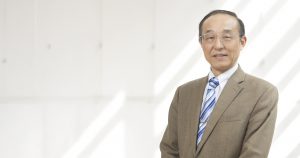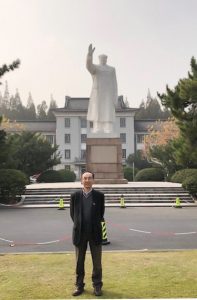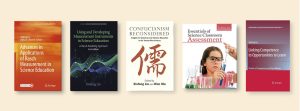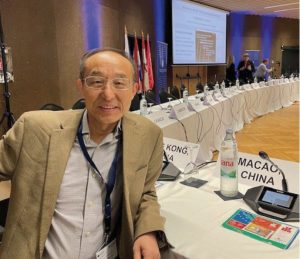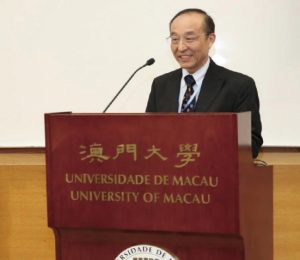Prof Liu Xiufeng is a globally recognised leader at the forefront of education research. With over three decades dedicated to the field, he has witnessed significant technological advancements and generational changes. A firm believer in the importance of science education for social progress, he is committed to enhancing scientific literacy worldwide. Prof Liu currently serves as a chair professor in the Faculty of Education and director of the Educational Testing and Assessment Research Centre at the University of Macau (UM). He is committed to using his extensive expertise and profound insights to further the cause of education.
From Teaching to Education Research
Prof Liu’s education journey began in 1978. He was among the first cohort of university students after the reinstatement of the National College Entrance Examination in mainland China. After graduation, he worked as a chemistry teacher, where he dedicated himself to improving teaching methods through hands-on practice and study. To further his knowledge, Prof Liu pursued a master’s degree at East China Normal University. Upon completing his studies, he joined the Chinese National Academy of Educational Sciences (formerly known as China National Institute for Educational Research) as a research associate.
In 1989, Prof Liu began his doctoral studies at the University of British Columbia under the encouragement of Prof David Robitaille, the then head of the Department of Mathematics and Science Education in the university’s Faculty of Education. After earning his PhD, Prof Liu held academic positions at universities in Canada and the US, where he conducted research on science education and contributed to major research projects including the Trends in International Mathematics and Science Study (TIMSS). During this time, he progressed steadily from assistant professor to associate professor, and to distinguished professor. In 2024, Prof Liu joined UM, bringing his extensive research experience and ability to combine his wealth of knowledge with cutting-edge theories.
‘I love doing research,’ Prof Liu says with a smile. ‘When I was a chemistry student and later a chemistry teacher, I found so much joy in conducting experiments and exploring how substances change. Education research feels very similar. I am keen on studying how education evolves and finding new ways to make learning more engaging and effective for students. It is both interesting and meaningful.’
Developing Rasch Tools for Science Education
Prof Liu has made significant contributions to science education research. One of his most notable achievements is his dedicated effort to promote the use of the Rasch model for measuring science education.
The Rasch model, developed in 1960 by Danish mathematician Georg Rasch, was designed to assess intelligence and achievement. It evaluates the difficulty of test items by analysing respondents’ overall answers while simultaneously estimating individual ability levels based on their performance. The late Benjamin Drake Wright, a professor of educational measurement at the University of Chicago, introduced the Rasch model to the field of educational assessment. In 1969, he developed BICAL, the first Rasch analysis software, which became the foundation for many of the measurement tools commonly used today.
Prof Liu played a pivotal role in extending the application of the Rasch model to measure student proficiency in science education. Although he never met Prof Wright personally, he attended several of his presentations at the American Educational Research Association annual meetings, which sparked his interest in the model. Inspired by Prof Wright’s work, Prof Liu applied the Rasch model for the first time in 2005 to analyse how students’ understanding of the concept of energy develops and changes from primary to secondary school. This approach effectively addressed the shortcomings of traditional assessment methods for science education, which relied solely on correct answer rates to measure proficiency and lacked common difficulty parameters, often leading to inaccurate results. In 2006, Prof Liu co-edited the book Applications of Rasch measurement in science education with William Boone, a student of Prof Wright. In 2010, he published Using and developing measurement instruments in science education: A Rasch modeling approach.
‘Benjamin has been the most influential figure in my academic research. In science education research, using more scientific measurement methods is essential,’ says Prof Liu. Guided by this philosophy, he has authored and edited 14 academic books, including three focused specifically on the Rasch model. He also serves as the editor of two science education journals and has published nearly 100 journal articles, which are instrumental in advancing the application of the Rasch model.
The Goals of Interdisciplinary Education
Prof Liu’s science education research spans a wide range of disciplines, including chemistry, physics, biology, earth sciences, and STEM education. In recent years, STEM education, which integrates science, technology, engineering, and mathematics, has received growing attention. Prof Liu’s work primarily focuses on quantitative research in STEM, exploring assessment methods, students’ comprehension of interdisciplinary learning, and the measurement and development of STEM identities among teachers and students.
Prof Liu notes, ‘According to the Curriculum Guidelines for Integrated and Applied Skills Education (Revised) issued by the Education and Youth Development Bureau of Macao, schools should allocate at least ten per cent of instructional time to integrated and applied skills learning, that is, STEM education. This approach enhances traditional subject-based teaching. Rather than replacing individual disciplines, it aims to achieve broader educational goals—for example, equipping students to solve interdisciplinary problems that transcend the boundaries of single subjects.’
In today’s education landscape, interdisciplinary learning is increasingly common. Prof Liu uses the 3D interactive exhibits of the Ruins of St. Paul’s at the Macao Science Center as an example. The exhibits, created by a secondary school student, integrate knowledge from architecture, computer science, history, and art. They show how breaking traditional subject boundaries helps students redefine their learning identities while enhancing confidence and motivation. Prof Liu believes that STEM education should work as an ecosystem and reach beyond schools to include communities, industries, businesses, NGOs, museums, and more. He explains, ‘The real world is inherently interdisciplinary. If STEM education reflects the realities of society, students gain a deeper understanding of how science, technology, and society interact. This not only inspires greater interest and competence in STEM-related careers, but also unleashes students’ creativity.’
Macao’s Great Potential in Science Education
Serving as the director of the Educational Testing and Assessment Research Centre holds profound significance for Prof Liu. The centre’s mission is to conduct large-scale educational measurement and evaluation studies in Macao, the Greater Bay Area, China, and internationally, with the goal of supporting the development of basic education in Macao and enhancing its overall education quality. Prof Liu explains, ‘One of our key responsibilities is to study and implement international assessment programmes such as PISA (Programme for International Student Assessment), TIMSS (Trends in International Mathematics and Science Study), and PIRLS (Progress in International Reading Literacy Study), which are also my research areas. I look forward to putting my research findings into practice. For me, this role is both a responsibility and an honour.’
Prof Liu continues, ‘Macao has a unique K to 12 education system. Most schools are private, affiliated with associations or religious institutions, with only a few public schools. There is no unified curriculum, standardised textbooks, or centralised exams at any stage of basic education. Schools and teachers enjoy considerable autonomy in their teaching.’ Surprisingly, despite this decentralised structure, Macao students consistently rank among the world’s top performers in math and science in PISA and TIMSS assessments. Moreover, the achievement gaps related to socioeconomic status are among the smallest globally, reflecting higher educational equity compared to other countries and regions.
With these strong foundations, Macao has significant potential to strengthen STEM education. ‘Teachers should no longer view themselves only as subject-specific instructors but should instead reimagine their roles as STEM educators who can break down subject boundaries,’ Prof Liu explains. ‘The University of Macau offers both pre-service and in-service training in science education, and many of the teachers and administrators in Macao’s schools are UM graduates. In line with social development, our training programmes emphasise interdisciplinary concepts and actively promote STEM education. Moreover, our centre works closely with schools. It uses their student assessment data to develop customised improvement plans. This collaboration approach sets Macao apart from other regions and, in my opinion, will help Macao’s schools reach their full educational potential.’
Enhancing Scientific Literacy Worldwide
Prof Liu emphasises, ‘Many people think that the purpose of science education is to cultivate professional scientists and drive technological progress. However, I believe that the ultimate goal of science education is to develop scientific literacy in every individual. Whether someone attends university, studies science or engineering, or pursues the arts, scientific literacy is essential. It is not just about learning foundational science knowledge; it is about adopting a data-driven mindset for making informed decisions.’ This belief about science education has deeply influenced Prof Liu’s educational journey. From his early career as a secondary school teacher, inspired by underprivileged students who transformed their lives through hard work, to his current role as a university professor reimagining science education, Prof Liu remains dedicated to challenging traditional teaching methods and reshaping educational practices. His mission is to elevate the role of science education, ensuring that more students can benefit from its lifelong benefits.
About Prof Liu Xiufeng
Liu Xiufeng is a chair professor in the Faculty of Education and director of the Educational Testing and Assessment Research Centre at the University of Macau. Prior to joining UM, he was a tenured faculty member at St. Francis Xavier University and the University of Prince Edward Island in Canada; and a SUNY Distinguished Professor of Science Education in the Graduate School of Education, University at Buffalo, State University of New York. In addition, Prof Liu serves as a chief consultant to the Collaborative Innovation Center of Assessment for Basic Education Quality in China, and is a fellow of the American Association for the Advancement of Science. Prof Liu is internationally recognised for his contributions to science education, particularly in the areas of conceptual learning and change, the integration of technology and disciplinary education, as well as educational measurement and evaluation. He has published extensively, with nearly 100 articles appearing in leading international journals. Currently, Prof Liu serves as an associate editor of Journal of Research in Science Teaching and a co‑editor‑in‑chief of Disciplinary and Interdisciplinary Science Education Research.
Text: Stella Kuan
Photo: Jack Ho, with some provided by the interviewee
English Translation: Bess Che
Source: UMagazine ISSUE 31


